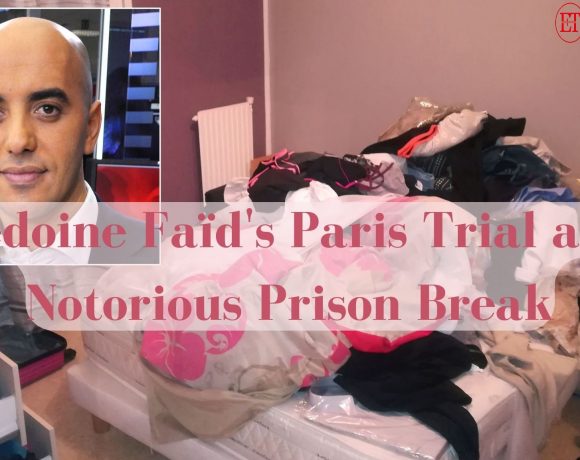
One of France’s most infamous criminals is currently on trial in Paris, with extensive security measures in place, for his daring escape from prison using a helicopter five years ago.
Due to Rédoine Faïd’s notoriety for prison breaks, French authorities have deployed a specialized gendarme unit to prevent any attempt to flee while traveling to and from the courtroom.
Reports indicate that there is a significant risk of another escape plot, as per police warnings.
Faïd, aged 51, stands accused alongside 11 other individuals, including his two older brothers.
Court accounts state that he arrived at the courthouse under tight police escort, followed by his brother Rachid, who is suspected of orchestrating the prison break.
At the time of his dramatic escape, Faïd was already serving a sentence for a previous jailbreak in 2013.
The escape involved two accomplices who held a helicopter pilot hostage and landed in the courtyard of Réau Prison, located south of Paris, on July 1, 2018. They used smoke bombs and angle grinders to access a nearby visiting room where Faïd was meeting his brother Brahim.
A prison guard described the two men, dressed as commandos, carrying Kalashnikov assault rifles, and how he and his colleagues were unable to respond to the attack. The helicopter, an Alouette II, quickly departed, and the entire operation took just minutes.
Faïd was eventually recaptured three months later during a raid on an apartment in his hometown of Creil.
His criminal career began with armed robberies and extortion in the crime-ridden suburbs of Paris during the 1990s. He later authored a book in which he detailed how the Hollywood film Heat influenced his attack on a security van in the 1990s, garnering him some degree of celebrity as he appeared on TV to promote the book.
After a brief release from one jail sentence in 2010, he was rearrested for violating the terms of his release. He subsequently received a lengthy prison term for masterminding a robbery in 2010, which resulted in the death of 26-year-old policewoman Aurélie Fouquet.
In 2013, he took four prison guards hostage and used explosions to break through five prison doors, making a dramatic escape from a jail near Lille in northern France. All four guards were eventually released, but Faïd remained on the run for six weeks before being recaptured and returned to prison.
Over the next seven weeks, Faïd’s trial will take place in a high-security courtroom on the Île de la Cité in Paris. He faces charges related to hijacking an aircraft and multiple prison escapes as part of an organized criminal group.
French media have reported on a confidential police alert highlighting a “significant risk of an escape attempt.”
However, Faïd’s legal team has protested against his solitary confinement at Fleury-Mérogis prison south of Paris, arguing that while his jailbreak was spectacular, it wasn’t inherently dangerous. One of his lawyers, Marie Violleau, pointed out, “Rédoine Faïd didn’t shoot at the guards, he didn’t shoot at the watchtowers… It barely lasted seven minutes, and that’s why the decision has been made to treat him like an animal and cut him off from the entire world.”
Among the 11 co-defendants are several members of Faïd’s family, including his brothers Rachid and Brahim. Another accused individual is Jacques Mariani, described as an heir to one of the founders of a notorious organized crime gang on the French island of Corsica.
Picture Courtesy: Google/images are subject to copyright

